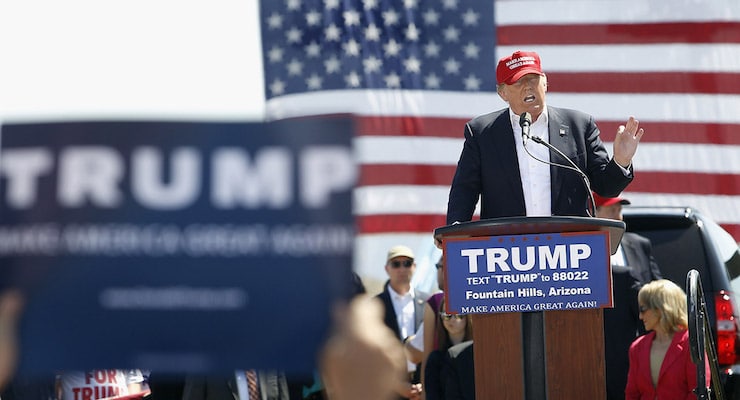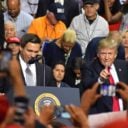
Donald Trump Isn’t Remaking the Republican Party’s Foreign Policy, He’s Restoring It

PHOENIX, AZ – MARCH 19: Republican presidential candidate Donald Trump speaks to guest gathered at Fountain Park during a campaign rally on March 19, 2016 in Fountain Hills, Arizona. (Photo by Ralph Freso/Getty Images)
In an extended 90-minute interview with The New York Times, Donald Trump revealed his America First foreign policy platform and a shortlist of advisors. Mr. Trump called for reforming NATO, leveling the financial and logistical burden, and modernizing the alliance to better enable it to meet the threat of radical Islam.
Despite a bipartisan majority of Americans agreeing with him, The Donald is taking fire–to include friendly fire–from elites and rivals in both parties. For most of the elites on the Right, the interview stands to confirm their fears that the Trump candidacy itself is a threat to their view of the Republican Party and the principles for which it stands.
Many, to include former House Speaker Newt Gingrich, find this ironic because, 1) the Republican Party hasn’t stood on principle, or for anything in years and 2) these critics seem to be in need of a basic history lesson.
Speaker Gingrich, a historian, of course does not and knows full-well Mr. Trump didn’t just make up the phrase “America First.” He took it straight out of the pre-neoconservative Republican Party vocabulary.
An America First Republican candidate in the 20th century–creatively referred to as “America-firsters”–fought against the League of Nations and later the United Nations. They opposed the Marshall Plan proposed by Democratic President Harry Truman, which called for $103 billion (in today’s dollars) to rebuild the economies of 16 European countries between 1948 and 1952. They advocated for post-World War trade deals that ensured U.S. businesses had a competitive advantage.
Yet, even Mr. Trump’s closest rival Texas Sen. Ted Cruz, called the frontrunner’s plan “isolationism.” This candidate is the very man who previously sounded more like Mr. Trump on foreign policy than the defeated neoconservative Florida Sen. Marco Rubio.
Of course, that was then and this is now. And now, Sen. Cruz finds himself in need of the neoconservative wing in order to win the nomination. Thus, he has quickly altered his message in both substance and tone publicly, as well as in private meetings with donors.
“It is striking that the day after Donald Trump called for weakening NATO, withdrawing from NATO, we see Brussels, where NATO is headquartered, the subject of a radical Islamic terror attack,” Sen. Cruz said. “Donald Trump is wrong that America should retreat from Europe, retreat from NATO, hand Putin a major victory and while he’s at it, hand ISIS a major victory.”
While we’ll soon address the substance of that attack, there’s little wonder why the rise of Donald J. Trump has sparked an identity crisis in the Republican Party. They don’t seem to remember where they came from. Considering Sen. Cruz’s connection to the Bushes, one might expect he remembers George W. Bush campaigned on the same NATO reform platform. Hell, he even railed against China on trade, routinely, harkening back to President Ronald Reagan hit Japanese automakers with a tariff to protect U.S. automakers.
They caved.
It wasn’t until the September 11, 2001 terror attacks that President Bush allowed his presidency to become the pinnacle of neocon power, much to the chagrin of his own father. President George H. W. Bush was a globalist who came up in a world dominated by realism, but even he understood the impracticality of neoconservatism. In truth, the intellectually debunked neoconservative school of thought was never a core Republican value.
Neocons are now closer policy-wise to the Democratic Party than any plank of the traditional GOP platform, as well they should be. They, being former liberal Democrats like Irvine Kristol, are a rather recent historical edition to the Republican Party and remain the voting minority, though they claim to be mainstream Republicans.
In fact, despite their disproportionate representation on Fox News, they’re are not at all representative of the base.
Let’s start with the not-so distant history nobody seems to want to discuss.

Irving Kristol was called “godfather” of neoconservatism. (Photo: Wiki)
Mr. Kristol, the father of Bill Kristol from the allegedly “conservative” anti-Trump publication The Weekly Standard, was one of many domestic liberals and globalists that split from the Democratic Party over foreign affairs, a process that began during the 1960s. Neocons believed President Jimmy Carter was too weak on national security and eventually became a small part of just one of the three legs President Reagan defined in his new Republican coalition.
Still, as Pat Buchanan recently pointed out, though he was counseled by them “the Gipper was no neocon” and was not influenced by them in any meaningful policy agenda.
Jeane Kirkpatrick, more of the more influential neocon advisors to President Reagan, wouldn’t even agree with modern neocons and their chosen candidates, the latest (whether you like it or not) being Sen. Cruz.

Jeane Kirkpatrick, former Ambassador to the United Nations under President Ronald Reagan. (Photo: Wiki)
In Dictatorships and Double Standards, an article that appeared in Commentary Magazine, Kirkpatrick outlined what international relations students would later dumb down to the ABCs, or “anything but communism.”
Unlike Bushism, the modern and practical embodiment of neoconservatism, Kirkpatrick drew a distinction between authoritarian and totalitarian regimes, the latter being the Soviet Union. More importantly, she believed and argued that certain countries could not transition to or sustain a governing democracy. Democracy, for these nations, was simply not compatible with their values and history.
That is no longer the case with neoconservatives, who advocate the promotion of democracy around the world through the use of U.S. military force or the primacy of U.S. power. But here’s the real kicker.
They mock the America First approach to foreign policy while advocating for another that is built on a lie, a lie fundamentally antithetical to conservatism. Conservatism, at its core, assumes that government is largely corrupt, incompetent and somewhat indifferent to the needs of civil society. Citizens, not civil servants, bureaucrats or politicians, are better positioned to know what is best for their communities.
So, if American national government is not suited to solve the domestic problems of its own people, why then should we have any confidence in its ability to solve the problems of other nations? Second, neoconservatism presupposes democracies are more peaceful than other forms of government, when in fact, there is absolutely no evidence to support this assumption. The democratic peace theory, which was perhaps best argued by Bruce Russett in Grasping the Democratic Peace, has been thoroughly discredited.
Intellectuals, contrary to popular belief, mock neoconservatism, the democratic peace theory and liberal internationalism, alike. Outside of the halls of the State Department and D.C.-based think tanks, most understand that the actions of nation-states and the balance of power are not governed by imaginary norms, weak global institutions and faux global cooperation.
They are governed by the principles of realism, i.e. the balance of power and pursuit of preservation. If given a chance, which is exactly what NATO does, so-called allied nations will free ride or jump on the bandwagon, and exploit the wealth of stronger states to defer responsibility for their own security. Enemies will bait and bleed, drawing them into prolonged conflicts, which they know the population doesn’t have the stomach to fight.
They know they don’t have the resolve to do what is politically incorrect yet necessary to defeat their enemy. Sound familiar?
Brian Kilmeade, during a phone interview with Mr. Trump on Fox and Friends Monday morning, leveled a similiar criticism heard by Sen. Cruz on the idea of reforming NATO at a time of Russian aggression. Mr. Trump correctly stated NATO is antiquated, designed to confront the threat of the Soviet Union rather than to meet the threat of radical Islam. Mr. Kilmeade, citing Ukraine, offered the same false choice as Sen. Cruz: dismantle NATO or leave it as is.
Mr. Kilmeade, as so many others have done, completely overlooked the obvious. NATO failed to prevent Russian President Vladimir Putin from annexing Crimea and much of eastern Ukraine. NATO failed to prevent the spread of radical Islam and, more recently, the terror attacks in Brussels and Paris that Sen. Cruz cited in his criticism of Mr. Trump.
Too often we in the media focus too much on what is not at all important and conflate the issues that are central to the discussion. NATO, fundamentally, was established and designed to confront nation-states. America now faces traditional nation-state enemies and non-state actors, as well. The North Atlantic Treaty Organization, which is more than 70-percent funded by the U.S., has been woefully inadequate at confronting either threat.
With the U.S. national debt approaching $20 trillion, which sounds more conservative or realistic? Leaving NATO, as is, or reforming it?
[mybooktable book=”our-virtuous-republic-forgotten-clause-american-social-contract” display=”summary” buybutton_shadowbox=”true”]








Anonymous / March 28, 2016
Amen, America First because we come first! Go globalist or go Trump. That’s the real choice and that’s the real history right there. It is really that simple. I’ll take the guy all these hacks are afraid over them any day. Not even close. Or, we could go back to stupid. That’s worked out real well for us.
/